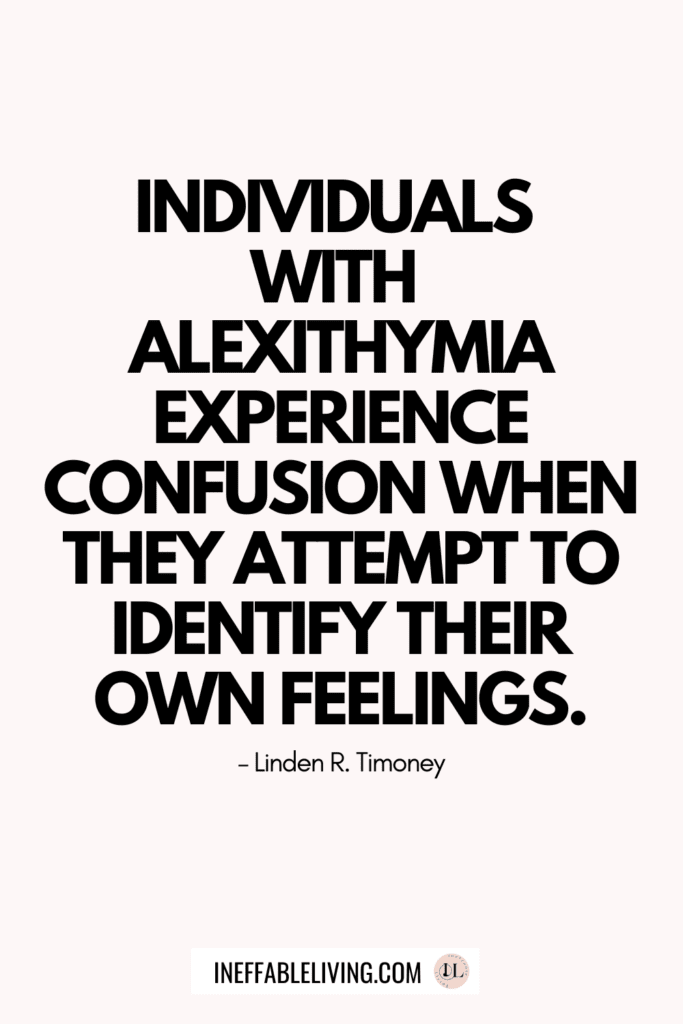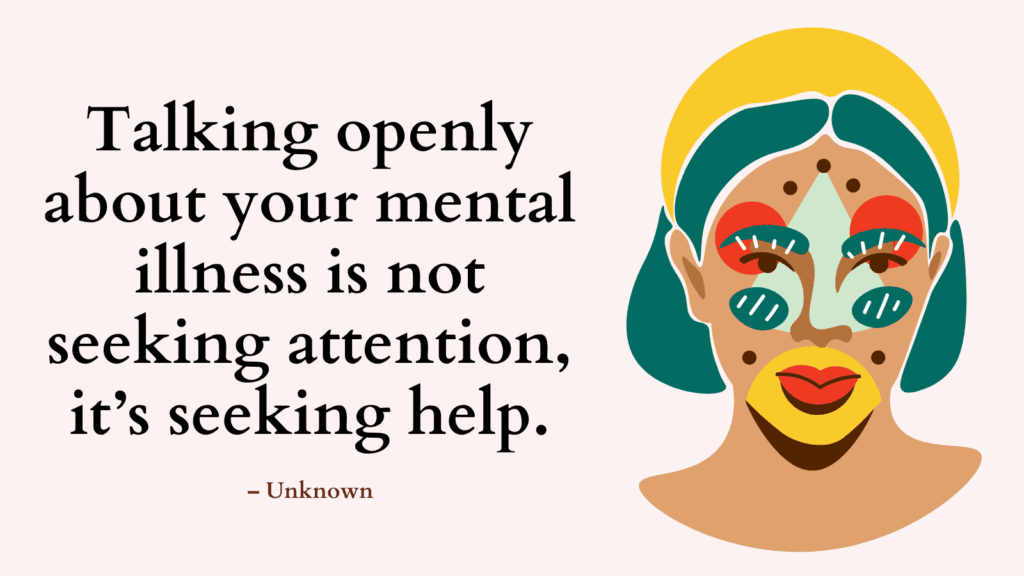This post contains some of the best alexithymia quotes that will make you feel seen.
What Is Alexithymia?
Alexithymia is the inability to identify and describe emotions.
Alexithymia means ‘without words for emotions’ (from the Greek a = lack, lexis = word, thymos = emotion).
Individuals with alexithymia have difficulty recognizing emotional states as they are happening, and they also struggle to recognize and respond to emotions in others.
The term alexithymia was first coined by psychiatrist Peter E. Sifneos in 1972 after noticing that some patients showed extreme difficulties in talking about their emotions.
Later more researchers joined the emerging study of alexithymia.
Related: Alexithymia Test (+ Top 5 Tips On Coping With Alexithymia)
Symptoms of Alexithymia
There is no formal diagnosis for alexithymia, but according to research, common signs of alexithymia include:
- difficulty identifying feelings and distinguishing between feelings and the bodily sensations of emotional arousal
- difficulty describing feelings to other people
- impaired imagination
- an externally-oriented thinking style (Taylor, Bagby and Parker 1997).
Related: Top 19 Emotional Intelligence Activities (To Improve Low Emotional Intelligence)
Alexithymia Quotes
1. “‘No’ seems to be the favourite default response of the alexithymic person. Even when asked a positive question like ‘The weather is fine, would you like to go for a walk?’, it is not unusual for an alexithymic individual to respond with a negative: ‘No… well I’m not sure… do you think it’s going to rain?’, even if trying to affirm their willingness to participate.” – Jason Thompson
2. “Alexithymia is often misunderstood to consist in a lack of emotions, or a refusal to disclose one’s feelings to others. It is neither of these.” – Jason Thompson
3. “At most they might have an uncomfortable sense of something changing inside their body – increased heart rate, blushing or butterflies in the stomach – and when pressed to give an account of their feelings, the alexithymic will have no words to offer, may fumble with a contrived answer or simply change the subject.” – Jason Thompson
4. “Because alexithymia inhibits one’s ability to identify and describe subjective emotions, alexithymic individuals may respond only with broad affective descriptions (e.g., ‘‘I feel sad’’), physical complaints (e.g., ‘‘My stomach feels upset’’), or uncertainty (e.g., ‘‘I’m not sure’’).” – Linden R. Timoney
5. “For those with alexithymia, interpersonal interactions are distinguished by coldness and distance, low empathy, and a general indifference toward others.” – Linden R. Timoney
6. “Individuals who are high in alexithymia exhibit more muted nonverbal emotional expression (i.e., facial expressions) than those low in alexithymia while discussing either positive or negative meaningful personal events.” – Linden R. Timoney
7. “Individuals with alexithymia experience confusion when they attempt to identify their own feelings.” – Linden R. Timoney
8. “Individuals with alexithymia have difficulty recognizing emotional states as they are happening. They may on later reflection gain a vague sense that they were in the grip of a strong emotion, like tearful sadness or rageful anger, but are usually at a loss when trying to piece together what caused such emotions to manifest; that is, they cannot picture what stimulated the mood.” – Jason Thompson
Related: How To Become A Stronger Empath? Top 20 Actionable Empathy Exercises to Become More Empathetic
9. “Not only are those with alexithymia unable to properly understand their own emotional states, they also demonstrate deficits comprehending the emotions of others.” – Linden R. Timoney
10. “People who suffer from alexithymia tend to feel physically uncomfortable but cannot describe exactly what the problem is. As a result they often have multiple vague and distressing physical complaints that doctors can’t diagnose. In addition, they can’t figure out for themselves what they’re really feeling about any given situation or what makes them feel better or worse. This is the result of numbing, which keeps them from anticipating and responding to the ordinary demands of their bodies in quiet, mindful ways. If you are not aware of what your body needs, you can’t take care of it. If you don’t feel hunger, you can’t nourish yourself. If you mistake anxiety for hunger, you may eat too much. And if you can’t feel when you’re satiated, you’ll keep eating.” ― Bessel A. van der Kolk
11. “Some alexithymic individuals manifest sudden and unpredictable episodes of crying, laughing, aggression and other emotional displays which are out of proportion to the aggravating stimulus, or discordant with the specific event. When questioned regarding the reasons for the outburst, they are often unable to link the behaviour with any memories or provocations, and may manufacture an excuse.” – Jason Thompson

12. “The alexithymic communication style is object-tied and logical, with a striking absence of poetic undertone which might reveal deeper resonances of psychic life. The alexithymic individual’s choice of language is used to seal off access to inner mental life and to prevent the formation of meaningful emotional connections between their internal world and other people.” – Jason Thompson
13. “Learn to familiarize yourself with the possible signs of emotion, such as a racing heart, feeling faint, blushing, breathlessness, body-tension, goose-bumps, butterflies, sickness or pain in the stomach. When such symptoms appear it will be difficult for you to distinguish whether these signs are from emotions or physical illnesses, such is the conundrum posed by alexithymia.” – Jason Thompson
Related: How To Be Gentle With Yourself? Top 5 Ways To Practice Self-Compassion
14. “Alexithymia may be a major posttraumatic sequel, and it represents an affect regression and/or arrest in the genetic development of affect.” – Henry Krystal
15. “A common finding in working with survivors of the Holocaust was that even when alexithymia and impairment in affect tolerance were relatively absent, there was a limit to how much loss the survivors could absorb through grieving and the degree to which they could achieve integrity and good-natured acceptance of the past. There seems to be an absolute limit to how much an individual is able to give up through grieving.” – Henry Krystal
16. “Patients suffering from chronic pain syndrome, “pain prone personalities,” turn out to have a very high rate of alexithymia as well.” – Henry Krystal
17. “There is no question about the reliability of findings that hemispheric disconnection results in alexithymia plus memory deficits, declining sexual interest, reduced initiative, and curtailed imagination.” – Henry Krystal
18. “Alexithymia varies in intensity from one case to another and sometimes within the same individual. While there are neither adequate instruments to test large populations nor enough experience to determine the overall incidence, it is clear that not all psychosomatic patients show clinically diagnosed alexithymia.” – Henry Krystal
19. “I do not expect alexithymia to present the same picture in every affected person. Rather, we must look for differences in intensity or extensiveness of involvement of one’s functions by blocking.” – Henry Krystal
20. “Alexithymia is a problem that is more common than is often thought of, and it affects people making interacting with others difficult.” – Juan Moises de la Serna
21. “Etymologically, the word “alexithymia” refers to the inability to describe feelings. It’s not a disease in itself, but a way of being that can be expressed in a variety of illnesses. These people have a proper functioning of the limbic system, what’s happening is that they haven’t learned to “put it to use” or they’ve simply “disposed” of their emotional world due to having considered it a “weakness” or something useless.” – Juan Moises de la Serna
22. “Once the family is aware of the difficulties experienced by the person with high alexithymia, they must know that this is not an illness, and that it can be treated, thereby, improving their quality of life and social relationships.” – Juan Moises de la Serna
23. “We should take into consideration that there are no associations of people with alexithymia or their families, as it’s not a disease in itself, but a problem of social and personal nature and those who suffer it just end up getting used to it without finding a solution.” – Juan Moises de la Serna
24. “Alexithymia is when a person has difficulty of identifying emotions in themselves and others; with problems in expressing their inner emotional life; with high levels of social conformity, difficulties in interpersonal relationships, poor insight, with limited capacity for imagination, outbursts of anger and “immature” personality: introverted, passive-aggressive or passive-dependent.” – Juan Moises de la Serna
25. “People with high levels alexithymia, manifest psychosomatic disorders with higher frequency, due to their dissociation between the internal (experienced) and external (expressed), along with being more likely to be related to what in the field of psychology is known as addictions, eating disorders, or psychopathic personality disorders.” – Juan Moises de la Serna
26. “Alexithymia is not considered a disease as such, but rather, a personality trait, people can have it at higher or lower extents.” – Juan Moises de la Serna
27. “The “problem” starts when a person has high levels of alexithymia or an alexithymic personality as difficulties in relationships begin to emerge, when they don’t understand the emotions of others or themselves, or don’t know how to properly express them.” – Juan Moises de la Serna
28. “The defining features of a personality with high Alexithymia are that, externally, these people can present themselves as narcissists, focused in their own world, avoiding commitments and social relations, psychoactive, not expecting from others, but rather, anticipating proposals and activities, showing an inadequate affection both in their emotionality as well as their intensity, with a type of impulsive behavior, guided by their own needs, without taking others into consideration.” – Juan Moises de la Serna
29. “We need to place ourselves in the shoes of a person with high levels of alexithymia to understand the psychological distress that it may lead to, living in a sort of constant fog where feelings and desires that are not, in any case, clear, are confused.” – Juan Moises de la Serna
30. “We must take into account that the alexithymic, or rather, the person with high levels of alexithymia is not considered to be suffering a disease as it’s just another personality trait.” – Juan Moises de la Serna
Recognize Your Bodily Sensations As A Sign of Emotions
When bodily sensations arise (e.g. racing heart, blushing, breathlessness, feeling faint, body-tension, goose-bumps, butterflies or pain in the stomach), consider that these could be signs of emotions rather than physical illness.
Try to make a connection between these bodily sensations and current circumstances to understand what feedback they have for you.
For example, body tension could be a sign that you’re feeling angry and that you’re facing some form of injustice.
Related: Best 99 Coping Skills (+FREE Coping Worksheets)
References
- Portions of this article were adapted from the book Emotional Processing Deficits and Happiness, © 2013 by Linden R. Timoney and Mark D. Holder. All rights reserved.
- Portions of this article were adapted from the book Emotionally Dumb, © 2009 by Jason Thompson. All rights reserved.
- Alexithymia – Wikipedia
- Alexithymia: Symptoms, diagnosis, and links with mental health (medicalnewstoday.com)
- The Emotional Blindness of Alexithymia – Scientific American Blog Network
- Frontiers | The Multifaceted Nature of Alexithymia – A Neuroscientific Perspective (frontiersin.org)
- Alexithymia and Autism Spectrum Disorder: A Complex Relationship – PMC (nih.gov)
- Alexithymia – an overview | ScienceDirect Topics
- Frontiers | A Scientometric Review of Alexithymia: Mapping Thematic and Disciplinary Shifts in Half a Century of Research (frontiersin.org)
- Four decades of research on alexithymia: moving toward clinical applications – PMC (nih.gov)



